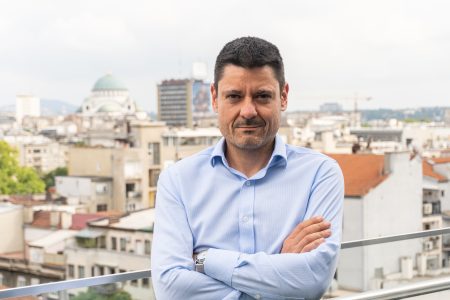I am confident that the development of technology and people will lead to greater access to justice and greater comfort for clients
For 25 years, Karanović & Partners has been recognized on the domestic and regional market as a law firm that deals with various legal issues and needs of domestic and foreign IT companies, but also those from other sectors. The firm is also focused on startups and innovative companies that are undergoing great growth or digital transformation. We talked to Rastko Petaković, Senior Partner at Karanović & Partners, about how a traditional profession, such as advocacy, follows and helps the digital transformation of the world.

Being 25 years in the law business sends out a strong statement and proves that Karanović & Partners is ahead of its time. How have you managed to do that?
That looks different from our angle. Our clients do great things and gather extraordinary people around them while startups are coming up with amazing ideas. When we started, computers just replaced typewriters and e-mail replaced a fax machine. Today, we are using artificial intelligence in the analysis of a large number of documents. Our clients have been using AI for years and we feel like we are lagging behind. Our office is a proud member of the Digital Serbia Initiative and believe me, in meetings with other members, I feel like we are not working nearly enough. There is a saying that goes – „if you are the smartest in the room, then you are in the wrong room“. In Digital Serbia, I feel on a completely different side of the spectrum, as if I am always in ‘the right room’.
At the recent virtual LegalTech Innovation Conference, you spoke about the impact of technology in the legal industry. Tell us a little more about it.
New technologies first begin to transform industries in which the influence of personal relationships and specialist knowledge wasn’t prominent. Netflix has replaced video clubs, Spotify has replaced record stores and Amazon has transformed the entire retail sector by offering customers more comfort and solving the problem of trusting with customer reviews. Our profession is at the very other ends of that spectrum. Our clients do not come to us because they found us on Google or read user reviews. They come because they have heard something about us from their colleagues, acquaintances and friends. In our relations with clients, trust, personal relationship and knowledge are key. In terms of specialist knowledge, we learn new things every day. Our profession is part of the knowledge industry. In such circumstances, where the approach to people and work matter the most, new technologies come a bit slower. That is the first angle of complexity that I talked about. The second angle concerns the space in which we live. Modern technological solutions in law are developing faster in the most developed countries, that is the USA and Great Britain. There are chatbots that solve traffic and tax violations, artificial intelligence systems that give advice on tax law, etc. All this facilitates their citizens’ access to justice and democratizes the complexities of the legal order. We are far from those solutions. This region is not attractive enough for developing such solutions, and the level of digital literacy has not reached a critical point that would democratize the approach to legal technologies.
The technological revolution and digital transformation is present in all sectors and clients recognize you as a reliable and long-term partner. How prepared are companies in Serbia and the region to keep up with the rest of the world?
Although I try to meet all the leading technology stakeholders in Serbia and the region, I am always glad when I hear about a new example of a fantastically implemented transformation in companies that are thus becoming globally important players. I intentionally say ‘transformations’, because I understand digital transformation much more broadly – it does not only mean the adoption of modern information technologies, but also a re-examination of the entire business model and the functioning of all sectors. Unfortunately, many companies still view the digital transformation as the introduction of an information system, the transition to the cloud or the implementation of extremely advanced solutions that are not fit for purpose. You wouldn’t believe how often companies receive offers for “a new advanced cloud-based solution that uses AI and syncs across all devices.” When you hear that, my advice is to run. Good practice for implementing digital transformation includes a detailed review of working methods, interviews with employees and clients, analysis of the legal framework, etc. It requires a lot of effort and serious business decisions. Fortunately, a large number of companies from this part of the world recognize and implement the best practices of transformation.

In the documentary „Uspeh odavde – priče ljudi iz IT sektora“, you talk about creating a successful digital ecosystem and the obstacles that stand in the way. How close are we to a solution?
If there is a will to overcome the problem, we will overcome it. There are fewer and fewer obstacles on that path and I am extremely proud of all the things we have done under the auspices of Digital Serbia. Talented people live and work in this part of the world and great ideas are born here. But our legal framework is not always their ally – that is why successful domestic startups are often forced to register their business in a western country to continue to operate normally. My mission is to change that. Five or ten years ago, it was not easy to explain the significance of the digital revolution. Today, 9 of the 10 most valuable companies in the world are involved in technology, and everyone is slowly recognizing that and providing support for improving the legal framework. That’s why I’m optimistic.
You give great support to your future colleagues through the K/andidates programme and many see it as a lifetime opportunity. How ready are the new generations for the future?
As I mentioned above – we work in the knowledge industry. That is why this programme and all programme for learning and sharing knowledge are at the very top of our priorities. Technology is important, but good technology and good people – that’s a winning combination. Even if we assume that a Uhura or Hal 9000 will replace us all, we again see a future in which people will work with these technologies. Each succeeding generation seems more ready for the future than the previous one. Many of our interns seem smarter and more capable than I was at their age.
You combine innovation, knowledge and curiosity in every segment and you are the first law firm in the region to create content in the form of podcasts. Who are they for?
For anyone who finds them useful. From my point of view, since I conceived the idea and enjoy the role of presenter and editor, I felt as if I had gained knowledge and experience during my work that I wanted to share with others. Since the beginning of my career, I have been doing extremely interesting jobs in which I have become acquainted in detail with numerous industries, from telecommunications to agriculture, from the chemical industry to video games and media. Both our clients and friends, who are guests of our podcast, want to share knowledge and experiences with us, as well as thoughts about the future. I received messages of support from acquaintances that I highly appreciate, from the world of science, startups, technology, etc. I hope that some episodes of the podcast will serve as inspiration for a great idea.
What is the future of the legal industry going to look like?
I see two key trends – both in the direction of further convergence of people and technology and the development of hybrid solutions. On the one hand, I expect a wider application of new technologies, primarily AI, and partly blockchain solutions. On the other, the development of people within new hybrid occupations such as “legal engineers”, that is lawyers who understand algorithms or engineers who know the legal theory. I am convinced that the development of technology and people will lead to greater access to justice and greater comfort for clients. In that sense, everything remains the same – as long as we are following our clients and meeting their needs, we are moving in the right direction.